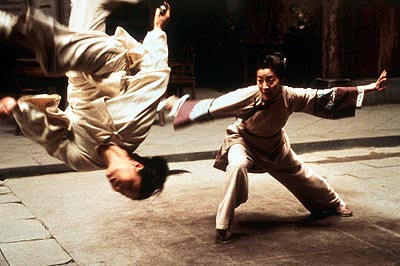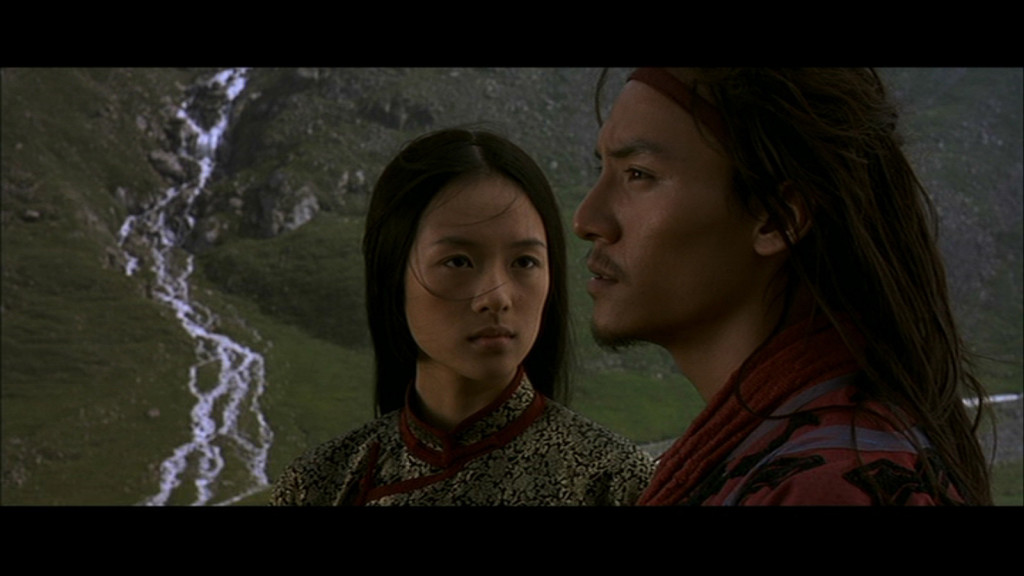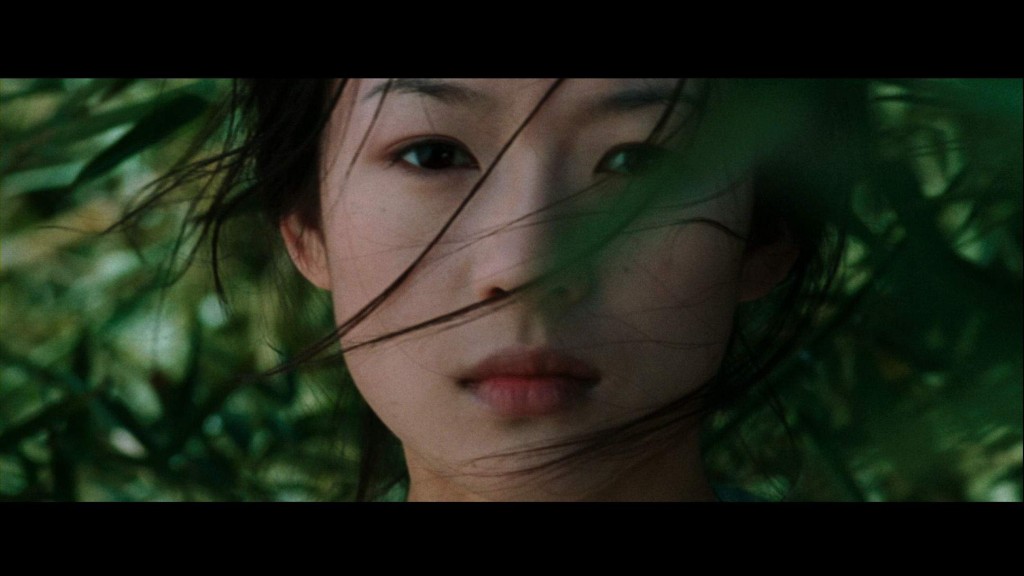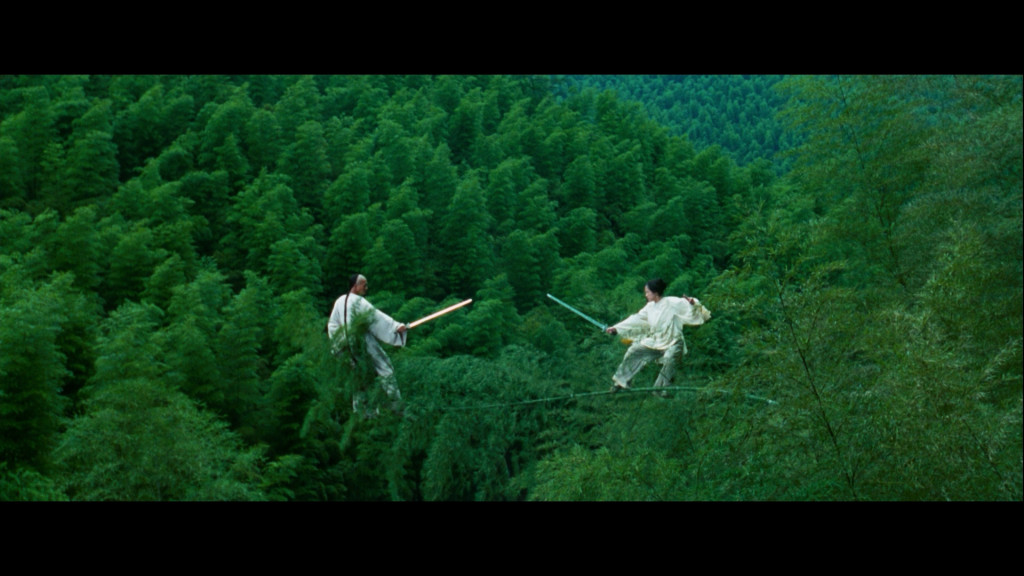 How Does This Hold Up? is a series where Alex and a guest check out a movie they haven’t seen in ages or that they’ve always been meaning to watch. They’ll compare the experience of watching these movies now to when they first saw or heard of them and explore the differences there-in.
How Does This Hold Up? is a series where Alex and a guest check out a movie they haven’t seen in ages or that they’ve always been meaning to watch. They’ll compare the experience of watching these movies now to when they first saw or heard of them and explore the differences there-in.
Alex: Hello and welcome back. Today I’m joined by my fellow Recorder writer, Andrew Rostan, whose Friday movie columns helped inspire this series. We’re here to talk about Crouching Tiger, Hidden Dragon, which is another one of those movies that helped introduce me to serious cinema as a teenager. I swear that there will be movies that were not some instrumental part of me growing up included eventually, but here we are for now.
Crouching Tiger was a movie I loved the idea of for months and rooted for at the 2000 Oscars, despite not seeing it. I convinced my parents to buy it as our family’s first DVD a few months later, even though I could only watch it on our PC. Continuing the motif of being a weird teenager, I loved Crouching Tiger so much that it set off a few years of Sinophilia and got me mocked at football practice. I guess jocks prefer Gladiator?
In any case, when I screened this for my Film History course last Friday it was the first time I’d seen the whole movie in a good ten years. My assessment remains the same: this movie kicks fucking ass. As testament to that fact, most of my students stayed an extra 20 minutes to finish the film after the school had an unannounced fire drill. I’ll get to why it kicks ass in a bit, Andrew, but first I wanted to hear about your relationship with Crouching Tiger.
Andrew: I definitely heard about Crouching Tiger, Hidden Dragon during my sophomore year of high school and saw clips of the more spectacular action sequences…and then it turned out to be the in-flight movie on the Latin Club’s trip to Italy. In an early and shrewd moment for my cinema appreciation, I watched half an hour and then ignored the rest because a) the stunts looked fake on the tiny, compressed screen and b) it was DUBBED. I knew this was not the experience I should have, and this opinion was confirmed when I finally did see it in widescreen, subtitled glory.
Glory is still the right word, because this movie, if I may answer the question, definitely holds up and will hold up as long as humans watch movies. There are several reasons for this, and the first relates to a part of the film that completely escaped my mind until my recent viewing: the desert flashback in the middle with Jen and Dark Cloud. It is so perfectly shot, full of the right mix of action and romance…and it seems at first to have nothing to do with the battle for the Green Destiny and yet has everything to do with it. Jen and Dark Cloud have experienced the physical passion Li and Shu never let themselves approach, but the same passion drives all four characters, and the audience realizing this allows us to personally empathize with these people and understand the ways they empathize with each other despite their conflicts.
This is important because one of the ways to make an enduring work of art is to be original within the bounds of a masterful tradition. Crouching Tiger recalls Homer, Virgil, and the other great epics for me. It shares themes of love, honor, and ritual. It also has a similar narrative style with an in medias res opening, complex characters, and little episodes like the desert sequence that break off from and return to the main plot in a way that accentuates the main plot. As a man even more well-versed in old literature and history than me, would you agree the film shares this timeless aesthetic?
Alex: Oh, it’s definitely timeless and certainly has echoes of that epic dramatic tradition you mentioned, Andrew. I would quibble that this is descended from Homer and Virgil, if only because it’s…ya know, Chinese. We don’t run into much of it in our Western educational systems, but China’s literary tradition is thousands of years old and probably had a lot more to do with Crouching Tiger’s enormously successful narrative than the Aenid. Maybe a better predecessor would The Romance of the Three Kingdoms, which is one of the classic Chinese novels and helped inspire the Wuxia genre in Chinese fiction. Crouching Tiger is adapted from one of the books in a series of Wuxia novels published in the early 20th Century. Wikipedia tells me that Wuxia are stories about martial artists who hold themselves to the chivalric code of xia, which sounds an awful lot like the same basic scenarios as medieval European romances and American Westerns. You and I love those sorts of stories, so it’s little wonder that we like this movie so much.
Which is all well and good, Andrew. But we have gone several paragraphs without mentioning something: THE ASS-KICKING! I’m not usually one to lose my head over action sequences or fight choreography, but holy pants, the battles in this movie are unreal. The collaboration between Ang Lee, the director, Peter Pau, the cinematographer, and Yuen Wo Ping, the fight choreographer, is cinematic sublimity. We’re forced to wait a bit for the first one, but once that rooftop chase begins and the camera start following Zhang Ziyi and Michelle Yeoh as they float across Beijing my critical facilities collapsed. I sat in front of my students and could not help the giant shit-eating grin plastered over my face. So, of course, Crouching Tiger goes ahead and tops that with the restaurant brawl, femme fight, and bamboo forest duel later on in the movie. I heard one of my students say that the first time he watched the film with his friend they just skipped past everything else to watch the fights. I almost can’t blame him, if it weren’t for the fact that the rest of the movie is fantastic as well.
So I’ll kick it back to you on that theme, Andrew. Beyond the epic passion you love and the ass-kicking that made me giddy, what else stands out in Crouching Tiger?
Andrew: The main thing I noticed on rewatching ties in with that first fight. Once the exposition is over (and that opening scene is so terrific…the viewer instantly picks up on the bonds acknowledged and unspoken between Li and Shu), the action begins with a fight between two women. Crouching Tiger is an outstandingly female-dominated film.
Absolutely nothing against Chow Yun-Fat, who plays Li with the strong, understated charisma of John Wayne, but his low-key role allows him to be the center around which even more dynamic figures revolve. Shu and Jen are both magnificently written characters and supremely portrayed by Michelle Yeoh and Zhang Ziyi. They’re always ready for action, they always have a plan, and they mostly (especially Shu) keep cool under pressure. Best of all…I read something lately that said if you want to be a truly great feminist storyteller, don’t make female characters strong to the point of perfection. Give them flaws. Jen’s impetuousness and Shu’s excessive devotion to her creed both give them trouble and misery and shape every step of the plot until the end. This sense of realistic agency extends to Jade Fox, who is trying to kill everyone else in the movie…but whose motivation came from her own desire to be a Wudang warrior, only to have the head of the order refuse to teach her but still sleep with her. Behind the ferocity of a formidable villain is a wounded soul who simply wants love and respect. This is character work which is a gift in the most immaculate dramas of human nature that don’t feature ass kicking.

And in regard to that ass-kicking, the centerpiece of the film for me comes in the three fights Jen has in rapid succession after retrieving the Green Destiny: the bar brawl with the hordes of men, the duel with Shu in her home, and the battle in the bamboo forest with Li. Not only are these outstandingly choreographed, but Ang Lee also infuses each one with a different tone and texture. The hilarity of the bar fight gives way the tragedy of war between two women who are so alike and have sworn spiritual sisterhood but whom circumstance pits as antagonists, and it ends in the poetic, natural encounter where Ziyi and Yun-Fat’s body movements harmonize with swaying trees and falling water. Tan Dun’s marvelous score (which Yo-Yo Ma gives a concertoesque feel to) perfectly complements the action.
Incidentally, Lee’s direction is so superb that a) I wish he would give us another film in this vein–which he won’t because, and I love him for this, he seems determined to never make the same film twice, and b) it amazes me all the more that he followed up this fun, exciting, emotionally resonant picture with…maybe the most NOT FUN superhero movie ever made? (Even Nolan and Snyder create jaw-dropping action sequences…Lee got the reins of the Incredible Hulk and decided to put the breaks on smashing.)
I could go on, but we’ve already taken up a lot of space. What’re your final thoughts on the movie, Alex, and is there some last part of the story we’ve missed that helps explain why it holds up so well?
Alex: Glad you mentioned the score, which is magnificent and one of my favorite film compositions. Oddly, it always reminds me of The Hobbit, because I listened to it on repeat the spring and summer that I first read Tolkien. Despite being deeply Chinese in its composition and instrumentation, it is an oddly perfect match for Tolkien’s mysterious and wondrous landscapes.
To wrap up, I think it holds up because of all the stuff we’ve been talking about: timeless storytelling, awesome action, and well-drawn characters. That it’s still the most globally successful and renowned Asian film is just the feather in its cap. Any movie that can assemble all of those excellent elements will be able to stand the test of time.
Verdict: It Hold Up Brilliantly; Might Even Get Better With Age








